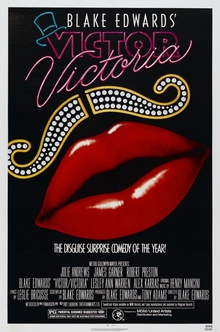Plot
In 1934 Paris, Carroll "Toddy" Todd, an aging gay performer at Club Chez Lui, sees Labisse, the owner, auditioning frail and impoverished soprano Victoria Grant. After her failed audition, Victoria returns to her hotel room to find herself about to be evicted, as she cannot pay her rent. That night, when hustler Richard, with whom Toddy is romantically involved, comes to Chez Lui as part of a straight foursome, Toddy incites a brawl resulting in damage and the police locking up whomever they can get their hands on. Labisse fires Toddy and bans him from the club. Walking home, Toddy spots Victoria in a restaurant. She invites him to join her. As both of them are poor, she plans to dump a cockroach in her salad to avoid paying, but it escapes and mayhem ensues.
The duo run through the rain to Toddy's, and he invites her to stay when she discovers the rain has shrunk and damaged her decrepit clothing. The next morning Richard shows up to collect his things. Victoria, who is wearing his suit and hat, hides in Toddy's closet. When Richard opens the closet, she punches him, breaking his nose before kicking him out. Seeing this, Toddy is struck with the inspiration of passing Victoria off as a man and presenting her to successful talent agent Andre Cassell as a female impersonator.
Cassell accepts her as Count Victor Grazinski, a gay Polish impersonator and Toddy's new boyfriend. Cassell gets her a booking in a nightclub show and invites club owners to the opening. Among the guests are Chicago gangster King Marchand, his moll Norma Cassidy and bodyguard Mr. Bernstein, also known as Squash. Victoria becomes a hit. King is smitten, but is shocked when she "reveals" herself to be a man at the end of the act. King, however, is convinced that "Victor" is not a man.
After Norma attacks King during a quarrel, he sends her back to the United States. Determined to uncover the truth, King sneaks into Victoria and Toddy's suite and confirms his suspicion when he spies her getting into the bath. In Chicago, Norma, angry over being dumped, tells King's business partner Sal Andretti that King is having an affair with a man. King invites Victoria, Toddy and Cassell to Chez Lui. Another fight breaks out. Squash, Cassell, and Toddy are arrested, along with many of the club clientele, but King and Victoria escape. King kisses Victoria, pretending that he does not care about her assumed gender.
Squash returns to the suite and catches him in bed with Victoria. King tries to explain, but then Squash reveals that he himself is gay. Victoria and King argue over whether or not the relationship could work and Victoria discovers that King is not really a gangster but someone who pretends to be to stay in the nightclub business. Both he and Victoria are pretending to be something they are not. Victoria returns to her room and finds Squash in bed with Toddy.
Meanwhile, Labisse hires private investigator Charles Bovin to tail Victor. Victoria and King attempt to live together, but keeping up her deception strains the relationship, and King eventually ends it. At the same time that Victoria decides to give up the Victor persona to be with King, Sal arrives and demands that King transfer his share of the business to Sal for a fraction of what it is actually worth. Squash tells Victoria what is happening, and she shows Norma that she is really a woman, saving King's stake.
That night at the club, Cassell tells Toddy and Victoria that Labisse lodged a police complaint against him and "Victor" for perpetrating a public fraud. After checking for himself, the inspector tells Labisse that the performer he saw in the room, after opening the door, is a man and accuses Labisse for being a idiot. Victoria joins King in the club as her real self. The announcer says that Victor will perform, but instead of Victoria, Toddy masquerades as "Victor". After an intentionally disastrous performance of "The Shady Dame From Seville," Toddy claims that this is his last performance.
